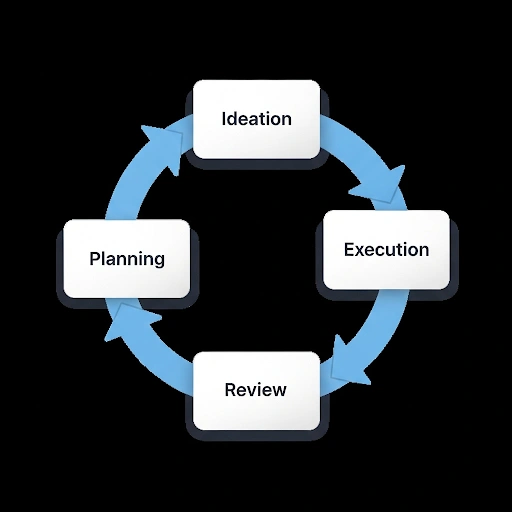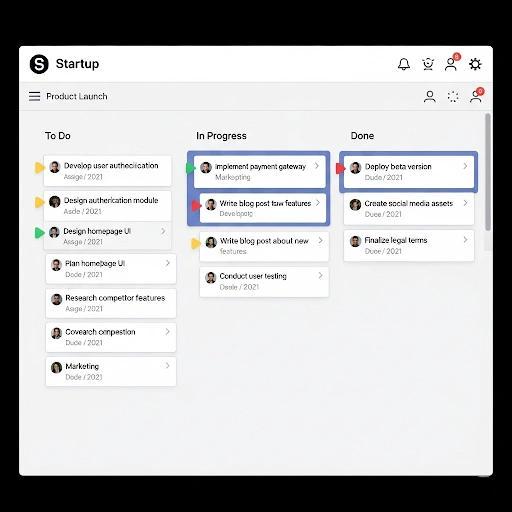- Bringing Order to the Startup Chaos
- What Is Project Management for Startups and Why is It Different?
- The Crucial Benefits for Startup Founders
- How It Works: The Core Frameworks and Tools
- A Founder’s Journey from Chaos to Clarity
- Choosing the Right PM Tool
- Common Mistakes to Avoid and How to Fix Them
- Expert Tips and Best Practices from the Field
- FAQs: Answering Your Top Questions
- From Founder to Master Builder
Bringing Order to the Startup Chaos
Startup life is often seen as late-night coding and fast growth, but in reality many founders face chaos. Balancing product, marketing, and sales with limited resources quickly becomes overwhelming. That’s why project management basics startup founders rely on are essential to stay on track. By applying project management basics for startup founders, you keep ideas from getting lost and deadlines in check. Mastering project management basics startup founders need builds structure, while project management basics startup founders practice daily turn survival into long-term success.
This comprehensive guide is built to simplify project management and give startup leaders a clear, actionable path. By applying project management basics startup founders can rely on, you’ll learn how to structure work, align your team, and execute with focus. Mastering project management basics for startup founders means moving from reacting to problems toward building sustainable growth. Whether you’re solo or leading a team, project management basics startup founders practice every day will turn ambitious goals into results.
What Is Project Management for Startups and Why is It Different?
At its core, project management is the discipline of planning, executing, and monitoring work to meet goals within a set timeline and budget. For large corporations, this may involve complex systems and specialized roles, but project management basics startup founders need focus more on speed and iteration. Instead of rigid processes, project management basics for startup founders emphasize clarity—what must be done, who is responsible, and why it matters. By mastering project management basics startup founders can turn a lean approach into a powerful advantage.
Effective project management in a startup context is different because of unique constraints and opportunities. Resources are limited, which is why project management basics startup founders rely on ensure every hour delivers value. The market shifts quickly, making it essential that project management basics for startup founders allow plans to pivot without losing focus. Small teams thrive when project management basics startup founders apply emphasize clear and transparent communication. In 2025 and beyond, mastering project management basics startup founders depend on gives an edge—helping lean teams move faster, seize opportunities, and consistently progress on what matters most.

The Crucial Benefits for Startup Founders
While the initial instinct for many founders is to just “get things done,” ignoring project management basics startup founders need often creates wasted effort. By applying project management basics for startup founders, every task gains clarity and direction. The discipline of project management basics startup founders practice turns chaos into measurable progress. Embracing these project management basics startup founders rely on gives lasting advantages that boost scalability and directly impact the bottom line.
Benefit 1: Increased Efficiency and Speed
Every founder knows that a startup’s most valuable asset is time. Project management forces you to prioritize. By defining clear goals, breaking down large tasks into smaller ones, and assigning clear responsibilities, you eliminate confusion and reduce duplicated efforts. This allows your small team to move at lightning speed, focusing their energy on the tasks that will deliver the most value to your customers and stakeholders. It’s about working smarter, not just harder.
Benefit 2: Reduced Risk and Failure
Failure in the startup world is often the result of unforeseen problems. A sound project management approach helps you identify and mitigate these risks early on. By creating a detailed plan, you can anticipate potential roadblocks and allocate resources to prevent them. This process includes everything from technical debt to market changes. When you have a clear roadmap, you can spot deviations from the plan and correct your course before they become critical issues. It’s your insurance policy against the unpredictable nature of building a new business.
Benefit 3: Enhanced Team Collaboration and Morale
In a small, fast-moving team, communication is everything. Project management tools and rituals, like daily stand-ups and clear task assignments, ensure that everyone is on the same page. This transparency builds trust and accountability. When every team member understands how their work fits into the bigger picture, they feel more ownership and purpose. This not only boosts productivity but also leads to higher morale and a stronger company culture. For more on building a resilient team, check out our article on Building a Resilient Startup Team.
How It Works: The Core Frameworks and Tools
To master the project management basics startup founders rely on, you don’t need a PMP certification. You just need to grasp how project management basics for startup founders can be applied in daily work. By focusing on the project management basics startup founders practice, you can streamline execution and keep momentum. Here’s a breakdown of the core components that make project management basics startup founders use both simple and effective.
1. Define Your Goals: The “Why” of Your Project
Before you do anything, you need to define success. This is where frameworks like OKRs (Objectives and Key Results) shine. Your Objective is your high-level goal—what you want to achieve. Your Key Results are the measurable metrics that tell you if you’ve achieved it. For example, an Objective could be “Launch our V1 product by Q3.” The Key Results could be “Reach 100 beta users,” “Achieve a 20% engagement rate,” and “Receive 50 positive reviews.” This clarity ensures your entire team is aligned on the purpose of their work.
2. Create a Plan: The “What” and “When”
Once you have your goals, you need a plan. Break down your project into manageable tasks. Use a simple project management tool (we’ll compare a few later) to create a clear roadmap. This roadmap should outline what needs to be done, the dependencies between tasks, and the estimated timelines. For most startups, an agile approach is best. This means you work in short, iterative cycles (often called “sprints”) of one to two weeks, focusing on delivering small, tangible pieces of the product or project at a time.
3. Execute and Communicate: The “Who” and “How”
Execution is where the rubber meets the road. In an agile system, daily stand-up meetings (which can be as short as 15 minutes) are crucial. Each team member answers three simple questions: What did I work on yesterday? What am I working on today? Are there any roadblocks? This simple ritual keeps everyone informed and allows the founder to quickly identify and remove obstacles. The key is to maintain a constant, transparent flow of information, ensuring everyone knows their role and can ask for help when they need it.
4. Review and Adapt: The “How Well”
At the end of each sprint or project phase, take the time to review your progress. This is often done in a “retrospective” meeting. The goal is to honestly assess what went well, what could be improved, and what changes should be made to your process moving forward. This continuous feedback loop is what makes agile project management so powerful; it allows you to constantly refine your approach and learn from both your successes and your failures.
A Founder’s Journey from Chaos to Clarity
Meet Jessica, the founder of “GrowthLink,” a B2B SaaS platform. In her first six months, Jessica’s team of three was brilliant, but they were working in a state of unmanaged chaos. Features were built without a clear purpose, deadlines were consistently missed, and team members were often working on competing priorities. The energy was high, but the output was low. Jessica realized she needed to embrace **project management basics startup founders** must master to survive.
Jessica decided to implement a simple agile system. She used a Kanban board in a tool like Trello to visualize the workflow: “To Do,” “In Progress,” and “Done.” Every week, the team would hold a planning session to define what they would accomplish, and every morning, they would have a 10-minute stand-up. The simple act of creating a shared board and a daily check-in completely changed the team’s dynamic. Everyone could see what their colleagues were working on, which eliminated redundant work. Tasks moved visibly from left to right on the board, which provided a powerful sense of accomplishment.
The result? Within a single quarter, GrowthLink’s feature release cycle became predictable. They launched a major new feature on time, which led to a significant increase in user sign-ups and their first major venture capital investment. Jessica’s story is a perfect example of how the right project management system can transform a promising idea into a viable business, proving that even a minimal investment in structure can have a massive payoff.

Choosing the Right PM Tool
As a founder, choosing the right tool is a critical first step. You need a platform that is easy to use, scalable, and affordable. Here’s a quick comparison of three popular options for startups.
| Tool | Best For | Pros | Cons |
|---|---|---|---|
| Trello | Visual, Kanban-style workflows. | Extremely simple to use, intuitive interface, great for visual thinkers. | Can become cluttered with complex projects, limited reporting. |
| Asana | Task management with multiple views. | Flexible project views (list, board, timeline), powerful integrations. | Steeper learning curve than Trello, free version has limitations. |
| Jira | Software development teams. | Robust, highly customizable, excellent for tracking bugs and technical tasks. | Can be overly complex for non-technical teams, not a great all-purpose tool. |
Common Mistakes to Avoid and How to Fix Them
Even with the right intentions, founders can stumble when applying project management basics startup founders often overlook. Avoiding these common mistakes will save time and frustration as you put project management basics for startup founders into practice. By staying focused on project management basics startup founders truly need, you can reduce wasted effort and sharpen execution. These lessons highlight why project management basics startup founders must master early can be the difference between scaling smoothly or burning out.
- Mistake 1: Not Documenting Processes. Many founders rely on verbal communication, but without a written record, important decisions and processes are lost. Solution: Document key decisions, meeting notes, and project requirements in a centralized location. Use a tool like Notion or a simple Google Doc.
- Mistake 2: Forgetting the “Why.” Getting caught up in the “what” and “how” without regularly reminding the team of the project’s purpose. Solution: Start every planning session and every key meeting by revisiting the OKRs or overall mission. Connect every task back to the bigger picture.
- Mistake 3: Overcommitting to a Timeline. Building a product is hard, and unforeseen challenges are inevitable. Promising a rigid timeline can lead to burnout and low morale. Solution: Use flexible timelines and build in buffer time. Be transparent with your team and stakeholders about the uncertainty inherent in the process.
- Mistake 4: Skipping Retrospectives. Rushing from one project to the next without pausing to learn from your mistakes. Solution: Dedicate time at the end of each sprint or project to reflect. Ask: What worked? What didn’t? What should we do differently next time? This is how you continuously improve.
Expert Tips and Best Practices from the Field
Moving beyond the project management basics startup founders usually start with, these advanced tips build a stronger foundation. By expanding on project management basics for startup founders, you can refine systems that adapt quickly. Applying project management basics startup founders rely on ensures growth stays manageable. These insights go further than the project management basics startup founders often practice, creating a system that is both effective and human-centric.
- Tip 1: Communicate Relentlessly. In a remote or hybrid environment, over-communicating is better than under-communicating. Use your project management tool to post updates, and don’t hesitate to use asynchronous tools like Slack or a quick Loom video to share context.
- Tip 2: Empower Your Team. Don’t micromanage. Once a task is assigned, give your team the autonomy to figure out the best way to get it done. Provide support, but don’t dictate every step. This builds trust and fosters a sense of ownership.
- Tip 3: Celebrate Wins, Big and Small. Project management can feel like an endless series of tasks. Make time to celebrate completed milestones, whether it’s shipping a minor feature or getting a positive review. This keeps morale high and reminds the team of their collective progress.
- Tip 4: Focus on Your “Why” to Stay Agile. A true **agile** approach isn’t about moving fast; it’s about moving fast toward the right goal. If your mission changes or you get new market feedback, be prepared to adjust your project plan. Don’t be afraid to change course if it’s the right move for the business.

FAQs: Answering Your Top Questions
Q1: What is the most important first step for a solo founder?
A: The most important first step is simply to write down your goals. Use a piece of paper or a simple document to outline what you want to achieve and what tasks are needed to get there. Don’t overthink it. Just start documenting your plans.
Q2: Should I use Agile or Waterfall?
A: For most startups, Agile is a better fit. Waterfall, a linear approach, is too rigid for the fast-paced, ever-changing environment of a startup. Agile, with its iterative and flexible nature, allows you to learn from each cycle and pivot as needed.
Q3: How often should we have meetings?
A: Keep meetings to a minimum. A 15-minute daily stand-up is often enough. Weekly planning meetings and a bi-weekly or monthly retrospective are also valuable. Use project management tools for updates, so you only meet to solve problems, not to share information.
Q4: How do I choose the right project management tool?
A: Start with a free, simple tool that meets your immediate needs. Prioritize ease of use. As your team grows, you can always migrate to a more robust platform. The goal is to start, not to find the perfect solution from day one.
Q5: What is technical debt and how does PM help?
A: Technical debt is the implied cost of additional rework caused by choosing an easy, but limited, solution now instead of a better, more robust approach. Project management helps you track and prioritize technical debt as tasks, ensuring it doesn’t pile up and slow down your development process later on.
From Founder to Master Builder
Founding a startup is tough, but it doesn’t have to be chaos. Applying project management basics startup founders need helps teams stay lean, efficient, and focused. These project management basics startup founders use cut friction, speed progress, and keep work on track. With project management basics for startup founders, your vision turns into reality one task at a time. Mastering project management basics startup founders rely on builds a strong foundation for long-term success.
To continue your journey into cloud security, consider the in-depth resources from the Cloud Security Alliance (CSA), a leading authority on cloud best practices. For more hands-on guides, check out our other posts on building a secure digital toolkit.
